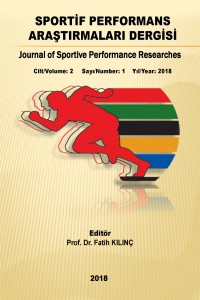Öz
Amaç: Bu
araştırma Türk futbolunda dört büyükler olarak kabul edilen kulüpler arası
rekabetçi dengenin zaman içinde nasıl değiştiğini ortaya koymayı
amaçlamaktadır.
Yöntem: Çalışmada
ülkemizde dört büyükler ifade edilen Beşiktaş, Fenerbahçe, Galatasaray ve
Trabzonspor futbol takımlarının sezonlar itibariyle ürettikleri ortalama puan
payları trend analizi yöntemiyle ekonometrik olarak analiz edilmiştir.
Bulgular:
Beşiktaş,
Galatasaray ve Fenerbahçe’nin ortalama puan paylarını kendi lehlerine ve Trabzonspor
aleyhine arttırdığı tespit edildi. Fenerbahçe ve Beşiktaş’ın puan paylarındaki
artış trendinin Galatasaray’dan daha fazla olduğu belirlendi. Beşiktaş uzun
dönem ortalama puan payı en düşük, Trabzonspor ise en yüksek takımdır. Ancak bu
kulüpler içerisinde Trabzonspor ortalama puan payı azalan tek takımdır.
Sonuç: Trend analizi
sonuçları Beşiktaş, Galatasaray ve Fenerbahçe futbol takımlarının ortalama puan
paylarının trend etrafında dalgalandığı ancak Trabzonspor’un puan payının
azalan bir trend gösterdiği sonucuna ulaşılmıştır.
Anahtar Kelimeler
Kaynakça
- 1. Brandes L., and Franck E. (2007). Who made who? An empirical analysis of competitive balance in European soccer leagues. Eastern Economic Journal, 33(3), 379-403.
- 2. Brook S. (2005). What do sports teams produce?. Journal of Economic Issues, 39(3), 792-797.
- 3. Enders W. (2010). Applied econometric time series. John Wiley and Sons.
- 4. Gürel SP, Gökçe H. (2012). The competitive balance levels in Turkish basketball and football leagues. Choregia, 8(1), 25-41.
- 5. Ramchandani G, Daniel P, Sophie B, Rob W, (2018). A longitudinal and comparative analysis of competitive balance in five European football leagues. Team Performance Management: An International Journal, https://doi.org/10.1108/TPM-09-2017-0055.
- 6. Goossens K. (2006). Competitive Balance in European Football: Comparison by adapting measures: national measure of seasonal imbalance and top 3. Rivista Di Diritto Ed Economia Dello Sport, 2(2), 77-122.
- 7. Groot L. (2008). Economics, uncertainty and European football: Trends in competitive balance. Cheltenham, UK: Edward Elgar Publishing.
- 8. İnan T. (2010). Türkiye spor toto süper liginde rekabetçi denge. Selçuk Üniversitesi Beden Eğitimi ve Spor Bilim Dergisi, 12 (3), 209–213.
- 9. İnan T, Kaya AM. (2011). Competitive balance in Turkish soccer. Ekonomika a Management, 5(2), 51-59.
- 10. İnan T. (2017). 30 Years trend of competitive balance in Turkish football super league. Journal of Education and Training Studies, 6(1), 63-69.
- 11. Rottenberg S. (1956). The baseball player’s labor market. Journal of Political Economy, 64(3), 242-258.
- 12. Michie J, Oughton C. (2004). Competitive balance in football: Trends and effects. London: The sportsnexus.
- 13. Montes F, Sala-Garrido R, Usai A. (2014). The lack of balance in the Spanish first division football league. European Sport Management Quarterly, 14(3), 282-298.
- 14. Szymanski S. (2001). Income inequality, competitive balance and the attractiveness of team sports: Some evidence and a natural experiment from English soccer. The Economic Journal, 111(469), 69-84.
Öz
Objective: The purpose of this study is to examined the trend properties of competitive balance between Beşiktaş, Galatasaray, Fenerbahçe, and Trabzonspor football teams.
Method: To examine the average point shares of Beşiktaş, Galatasaray, Fenerbahçe, and Trabzonspor, we utilize trend analysis with deterministic trend.
Results: Besiktas, Galatasaray, and Fenerbahçe increase their average points in favor and against Trabzonspor. Fenerbahce and Besiktas's share of the increase in the trend is more than Galatasaray. Besiktas long-term average points share is the lowest and Trabzonspor is the highest team. But Trabzonspor is the only team that declined the average score share.
Conclusion: We find that the average point shares of these teams fluctuate around the deterministic trend but Trabzonspor’s average point share shows a decreasing trend.
Anahtar Kelimeler
Competitive Balance Trend Analysis Competition Sport Economics
Kaynakça
- 1. Brandes L., and Franck E. (2007). Who made who? An empirical analysis of competitive balance in European soccer leagues. Eastern Economic Journal, 33(3), 379-403.
- 2. Brook S. (2005). What do sports teams produce?. Journal of Economic Issues, 39(3), 792-797.
- 3. Enders W. (2010). Applied econometric time series. John Wiley and Sons.
- 4. Gürel SP, Gökçe H. (2012). The competitive balance levels in Turkish basketball and football leagues. Choregia, 8(1), 25-41.
- 5. Ramchandani G, Daniel P, Sophie B, Rob W, (2018). A longitudinal and comparative analysis of competitive balance in five European football leagues. Team Performance Management: An International Journal, https://doi.org/10.1108/TPM-09-2017-0055.
- 6. Goossens K. (2006). Competitive Balance in European Football: Comparison by adapting measures: national measure of seasonal imbalance and top 3. Rivista Di Diritto Ed Economia Dello Sport, 2(2), 77-122.
- 7. Groot L. (2008). Economics, uncertainty and European football: Trends in competitive balance. Cheltenham, UK: Edward Elgar Publishing.
- 8. İnan T. (2010). Türkiye spor toto süper liginde rekabetçi denge. Selçuk Üniversitesi Beden Eğitimi ve Spor Bilim Dergisi, 12 (3), 209–213.
- 9. İnan T, Kaya AM. (2011). Competitive balance in Turkish soccer. Ekonomika a Management, 5(2), 51-59.
- 10. İnan T. (2017). 30 Years trend of competitive balance in Turkish football super league. Journal of Education and Training Studies, 6(1), 63-69.
- 11. Rottenberg S. (1956). The baseball player’s labor market. Journal of Political Economy, 64(3), 242-258.
- 12. Michie J, Oughton C. (2004). Competitive balance in football: Trends and effects. London: The sportsnexus.
- 13. Montes F, Sala-Garrido R, Usai A. (2014). The lack of balance in the Spanish first division football league. European Sport Management Quarterly, 14(3), 282-298.
- 14. Szymanski S. (2001). Income inequality, competitive balance and the attractiveness of team sports: Some evidence and a natural experiment from English soccer. The Economic Journal, 111(469), 69-84.
Ayrıntılar
| Birincil Dil | Türkçe |
|---|---|
| Konular | Spor Hekimliği |
| Bölüm | Spor Yönetimi |
| Yazarlar | |
| Yayımlanma Tarihi | 8 Kasım 2018 |
| Yayımlandığı Sayı | Yıl 2018 Cilt: 2 Sayı: 1 |


